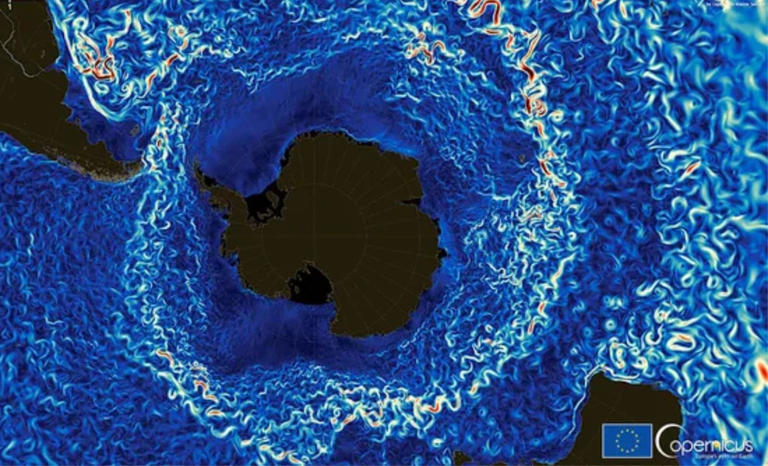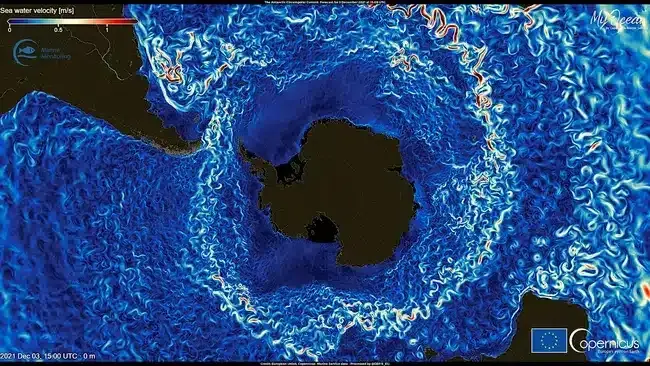Earth’s Strongest Ocean Current Is Failing—And the Consequences Could Be Catastrophic
Story by Lydia Amazouz
• 2h •
3 min read
The Antarctic Circumpolar Current (ACC), the strongest ocean current on Earth, is rapidly weakening due to the accelerating melt of Antarctica’s ice sheet. According to a new study published in Environmental Research Letters, researchers warn that this current could slow down by up to 20% by 2050, a dramatic shift that would disrupt global climate patterns, ocean temperatures, and rising sea levels.
Researchers from the University of Melbourne in Australia used supercomputer simulations to model how freshwater influx from melting ice is weakening the convection process that fuels the ACC. Their findings suggest that the weakening current could accelerate ice loss, intensify extreme weather, and alter ocean ecosystems worldwide.
Why the Antarctic Circumpolar Current is so importantThe ACC is a massive current that moves about 264 million gallons of water per second around Antarctica, creating a barrier that separates the Southern Ocean from the rest of the world’s oceans. This current plays a critical role in Earth’s climate system by:
·Regulating global ocean temperatures by connecting the Atlantic, Pacific, Indian, and Southern Oceans
·Blocking invasive species from reaching Antarctica’s fragile ecosystem
·Preventing warm waters from melting Antarctic ice at an accelerated rate
A slowdown of the ACC could disrupt these natural balancing mechanisms, causing cascading effects throughout the world’s oceans.
How Melting Ice Is Causing the SlowdownThe study’s simulations indicate that the increasing influx of fresh, cold meltwater fromAntarctica’s ice sheet is disrupting the normal convection process, which moves cold water from the surface down into deeper layers of the ocean. With this mechanism weakened, the deep Southern Ocean is warming, and meltwater is spreading farther north before sinking.
This change in ocean water density is directly linked to the slowing of the ACC and has significant consequences:
·More warm water could reach Antarctica’s ice sheet, accelerating ice melt and raising sea levels
·Weaker circulation could disrupt weather patterns and ocean currents worldwide
·Ecosystems that depend on stable ocean temperatures could be severely impacted
Global Impacts of a Weakening Ocean CurrentWhile this slowdown is happening in one of the most remote regions on Earth, its effects will be felt across the entire planet. The ACC is a major driver of ocean circulation, meaning that if it weakens, other ocean currents will be affected.
Some of the key global consequences include:
·More extreme weather events due to changes in heat distribution across the planet
·Rising sea levels from accelerating ice melt, particularly in coastal regions vulnerable to flooding
·Disruptions in marine life and fisheries, as species that rely on specific temperature conditions struggle to adapt
·Increased risk of invasive species in Antarctic waters, as the weakened current allows non-native organisms to migrate south more easily
The Need for Long-term MonitoringOne of the challenges scientists face is that theAntarctic Circumpolar Current has not been monitored for very long, making it difficult to determine exactly how much of this slowdown is part of a natural cycle versus climate change-driven acceleration.
According to researchers, long-term data collection is essential to better understand how the ACC is evolving and what future climate models should predict. Expanding satellite observations, deploying more ocean monitoring instruments, and improving climate simulations will help scientists track these changes more accurately.
A Warning for the FutureThe weakening of the Antarctic Circumpolar Current is yet another sign that climate change is already affecting Earth’s largest natural systems. While the full impact of this slowdown is still unfolding, the study’s findings highlight the urgency of addressing global warming and protecting Antarctica’s ice sheet.
If left unchecked, the continued melting of Antarctic ice could push ocean currents past a tipping point, leading to irreversible disruptions in Earth’s climate. Scientists warn that the world must act now to reduce greenhouse gas emissions and mitigate the worst effects of global climate change.
Enjoyed this article? Subscribe to our free newsletter for engaging stories, exclusive content, and the latest news.
For more news like this, visit Dailygalaxy.com.

Earth’s Strongest Ocean Current Is Failing—And the Consequences Could Be Catastrophic | The Daily Galaxy --Great Discoveries Channel © Daily Galaxy US

The Antarctic Circumpolar Current is the strongest ocean current on Earth. (Image credit: European Union, Copernicus Marine Environment Monitoring Service) © Daily Galaxy US
 Related video: Antarctica Could Lose Its Ice Forever (Live Science) Related video: Antarctica Could Lose Its Ice Forever (Live Science) |






